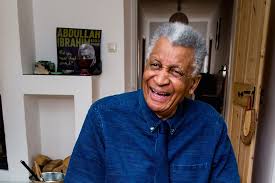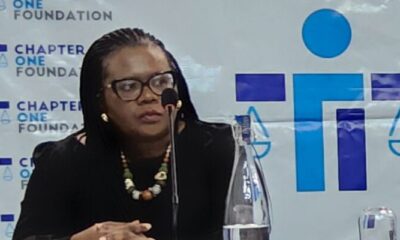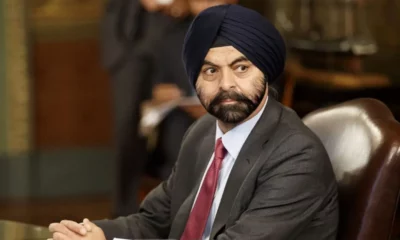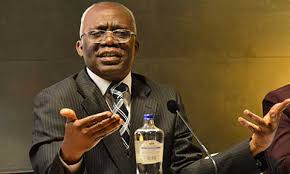Strictly Personal
Did Kenya’s IEBC deliver? Well, it isn’t over till the fat lady sings by Jenerali Ulimwengu
Published
2 years agoon

If I spoke too soon when I gave Kenya’s electoral governing body a clean bill of health over the organization and running of this year’s General Election, I own up and beg my readers’ indulgence.
But then, my apology will not be anywhere near self-flagellation for not seeing that the fat woman had not sung when I lauded the Independent Electoral and Boundaries Commission (IEBC) for a job well done. For, indeed it was done well, up to that point.
Up to the point when I was writing my piece, I had observed, as many others had, the orderly fashion in which the results from constituencies across Kenya were streaming in, being received, collated and posted.
It was that discipline, that serenity that had overwhelmed me and, naturally desperate to get a sweet story once in a while does not hurt anyone.
Glaring shortcomings
I am not going to change tack and see too many glaring shortcomings in the way that the election was run, because, simply, there were very few, especially when we compare them with what Kenya’s neighbours to the south and to the west are used to doing.
The point here is that in all matters developmental, even the best is not good enough, and there is always room for improvement.
For me, it has been a grim struggle all along for Kenya ever since I started following the politics of the country at various stages, since I was in my early youth.
Even today I still remember one Ronald Ngala of KADU, who advocated the policy of “Majimbo” until he died in a motor accident caused, we were told then, by bees invading his car on Mombasa road.
Is it not ironical that the policy of “Ugatuzi” embraced and practised by all today has its intellectual genesis in Ngala’s seminal labour back then?
Many a time it looked like the Kenyans were so hopelessly divided along ethnic lines that there was no possibility for them to organise along more serious issues, until it started getting accepted that the tribal units, though too often vilified, are the building blocks on top of which national cohesion could be crafted.
And why not?
Colonial expeditions
Before the colonial expeditions that came to capture our land masses, we had neither Kenya nor Kenyans, and the colonial political organisation was just for the organisation of the forced labour into which we were shoehorned to supply the metropoles with whatever they needed to make themselves more powerful.
Kenya’s example can fascinate. The British colonists who stumbled onto the rich and seductive lands around Mount Kenya and the Rift valley — remember Happy Valley? — were perhaps only passing through, going to Jinja to secure the source of the Nile, to make Egypt and the Suez Canal safer, so as to protect the passage to India!
Imperial wheel
There was precious little concern for the welfare of Kenya and Kenyans except as cogs in the great imperial wheel with its axel in Bombay.
Even these names, Kenya and Kenyans, were a British invention, just as Tanganyika was German.
Ngala’s quest around the policy of “majimbo” was a recognition of the diversity of Kenyans and the desire for the various communities to have governance structures and processes corresponding to the imperatives of their localities and cultures.
If all politics is local, devolved politics becomes king.
Of course, after 2010, there have been complaints to the effect that devolution has somehow translated into corruption being devolved to local counties, but my response to that is that it must be a good thing if that is true, as efforts to fight that corruption will also be devolved to the local levels, making every Wanjiku at the most basic level a full-fledged participant in the anti-corruption crusade.
So, as far as I am concerned, devolution has been a good thing for Kenya, and only needs to be fine-tuned to make it more efficient and responsive to local needs.
My reservations
That said, I have to register my reservation around a number of issues that I observed.
One arises out of what has come to dominate the conversations around the powers of the chair of the IEBC, who seems to have been given absolute powers (by the constitution) to make decisions without taking into consideration the views of other commissioners.
In the instant case, where a majority of the commission would effectively be in the minority by operation of constitutional provisions, I think there needs to be urgent changes to those provisions, because it is a no-brainer to have a commission that is in effect a one-man ‘commission’ in certain crucial matters.
As it seems certain that the losers in the presidential polls will challenge the chairman’s results in court, is there a possibility that more than half the commission will side with the petitioners against the results given by the chairman of the commission?
I have no way of knowing, and time will tell. It looks like the fat lady has not sung yet.
Jenerali Ulimwengu is now on YouTube via jeneralionline tv. E-mail: jenerali@gmail.com
You may like
-


This Sudan war is too senseless; time we ended it, By Tee Ngugi
-


Air Peace, capitalism and national interest, By Dakuku Peterside
-


This is chaos, not governance, and we must stop it, By Tee Ngugi
-


Off we go again with public shows, humbug and clowning, By Jenerali Uliwengu
-


How patriarchy underpins gender violence today, By Tee Ngugi
-


Help! There’s a dangerous, secret plot to save the EAC from imminent death, By Charles Onyango-Obbo
Strictly Personal
This Sudan war is too senseless; time we ended it, By Tee Ngugi
Published
3 days agoon
April 28, 2024
Why are the Sudanese Armed Forces (SAF) and the paramilitary Rapid Support Forces (RPF) engaged in a vicious struggle? It is not that they have ideological, religious or cultural differences.
Not that people should fight because of these kinds of differences, but we live in a world where social constructions often lead to war and genocide. It is not that either side is fighting to protect democracy. Both sides were instruments of the rapacious dictatorship of Omar el-Bashir, who was overthrown in 2019.
Both are linked to the massacres in Darfur during Bashir’s rule that led to his indictment by the International Criminal Court for crimes against humanity. They both stood by as ordinary, unarmed people took to the streets and forced the removal of the Bashir regime.
None of these entities now fighting to the last Sudanese citizen has any moral authority or constitutional legitimacy to claim power. They both should have been disbanded or fundamentally reformed after the ouster of Bashir.
The SAF and the RSF are fighting to take over power and resources and continue the repression and plunder of the regime they had supported for so long. And, as you can see from news broadcasts, they are both well-versed in violence and plunder.
Since the fighting began in 2023, both sides have been accused of massacres that have left more than 30,000 people dead. Their fighting has displaced close to 10 million people. Their scramble for power has created Sudan’s worst hunger crisis in decades. Millions of refugees have fled into Chad, Ethiopia and South Sudan.
The three countries are dubious places of refuge. Chad is a poor country because of misrule. It also experiences jihadist violence. Ethiopia is still simmering with tensions after a deadly inter-ethnic war.
And South Sudan has never recovered from a deadly ethnic competition for power and resources. African refugees fleeing to countries from which refugees recently fled or continue to flee sums up Africa’s unending crisis of governance.
Africa will continue to suffer these kinds of power struggles, state failure and breakdown of constitutional order until we take strengthening and depersonalising our institutions as a life and death issue. These institutions anchor constitutional order and democratic process.
Strong independent institutions would ensure the continuity of the constitutional order after the president leaves office. As it is, presidents systematically weaken institutions by putting sycophants and incompetent morons in charge. Thus when he leaves office by way of death, ouster or retirement, there is institutional collapse leading to chaos, power struggles and violence. The African Union pretends crises such as the one in Sudan are unfortunate abnormally. However, they are systemic and predictable. Corrupt dictatorships end in chaos and violence.
Tee Ngugi is a Nairobi-based political commentator.
Strictly Personal
Air Peace, capitalism and national interest, By Dakuku Peterside
Published
2 weeks agoon
April 16, 2024
Nigerian corporate influence and that of the West continue to collide. The rationale is straightforward: whereas corporate activity in Europe and America is part of their larger local and foreign policy engagement, privately owned enterprises in Nigeria or commercial interests are not part of Nigeria’s foreign policy ecosystem, neither is there a strong culture of government support for privately owned enterprises’ expansion locally and internationally.
The relationship between Nigerian businesses and foreign policy is important to the national interest. When backing domestic Nigerian companies to compete on a worldwide scale, the government should see it as a lever to drive foreign policy, and national strategic interest, promote trade, enhance national security considerations, and minimize distortion in the domestic market as the foreign airlines were doing, boost GDP, create employment opportunities, and optimize corporate returns for the firms.
Admitted nations do not always interfere directly in their companies’ business and commercial dealings, and there are always exceptions. I can cite two areas of exception: military sales by companies because of their strategic implications and are, therefore, part of foreign and diplomatic policy and processes. The second is where the products or routes of a company have implications for foreign policy. Air Peace falls into the second category in the Lagos – London route.
Two events demonstrate an emerging trend that, if not checked, will disincentivize Nigerian firms from competing in the global marketplace. There are other notable examples, but I am using these two examples because they are very recent and ongoing, and they are typological representations of the need for Nigerian government backing and support for local companies that are playing in a very competitive international market dominated by big foreign companies whose governments are using all forms of foreign policies and diplomacy to support and sustain.
The first is Air Peace. It is the only Nigerian-owned aviation company playing globally and checkmating the dominance of foreign airlines. The most recent advance is the commencement of flights on the Lagos – London route. In Nigeria, foreign airlines are well-established and accustomed to a lack of rivalry, yet a free-market economy depends on the existence of competition. Nigeria has significantly larger airline profits per passenger than other comparable African nations. Insufficient competition has resulted in high ticket costs and poor service quality. It is precisely this jinx that Air Peace is attempting to break.
On March 30, 2024, Air Peace reciprocated the lopsided Bilateral Air Service Agreement, BASA, between Nigeria and the United Kingdom when the local airline began direct flight operations from Lagos to Gatwick Airport in London. This elicited several reactions from foreign airlines backed by their various sovereigns because of their strategic interest. A critical response is the commencement of a price war. Before the Air Peace entry, the price of international flight tickets on the Lagos-London route had soared to as much as N3.5 million for the economy ticket. However, after Air Peace introduced a return economy class ticket priced at N1.2 million, foreign carriers like British Airways, Virgin Atlantic, and Qatar Airways reduced their fares significantly to remain competitive.
In a price war, there is little the government can do. In an open-market competitive situation such as this, our government must not act in a manner that suggests it is antagonistic to foreign players and competitors. There must be an appearance of a level playing field. However, government owes Air Peace protection against foreign competitors backed by their home governments. This is in the overall interest of the Nigerian consumer of goods and services. Competition history in the airspace works where the Consumer Protection Authority in the host country is active. This is almost absent in Nigeria and it is a reason why foreign airlines have been arbitrary in pricing their tickets. Nigerian consumers are often at the mercy of these foreign firms who lack any vista of patriotism and are more inclined to protect the national interest of their governments and countries.
It would not be too much to expect Nigerian companies playing globally to benefit from the protection of the Nigerian government to limit influence peddling by foreign-owned companies. The success of Air Peace should enable a more competitive and sustainable market, allowing domestic players to grow their network and propel Nigeria to the forefront of international aviation.
The second is Proforce, a Nigerian-owned military hardware manufacturing firm active in Rwanda, Chad, Mali, Ghana, Niger, Burkina Faso, and South Sudan. Despite the growing capacity of Proforce in military hardware manufacturing, Nigeria entered two lopsided arrangements with two UAE firms to supply military equipment worth billions of dollars , respectively. Both deals are backed by the UAE government but executed by UAE firms.
These deals on a more extensive web are not unconnected with UAE’s national strategic interest. In pursuit of its strategic national interest, India is pushing Indian firms to supply military equipment to Nigeria. The Nigerian defence equipment market has seen weaker indigenous competitors driven out due to the combination of local manufacturers’ lack of competitive capacity and government patronage of Asian, European, and US firms in the defence equipment manufacturing sector. This is a misnomer and needs to be corrected.
Not only should our government be the primary customer of this firm if its products meet international standards, but it should also support and protect it from the harsh competitive realities of a challenging but strategic market directly linked to our national military procurement ecosystem. The ability to produce military hardware locally is significant to our defence strategy.
This firm and similar companies playing in this strategic defence area must be considered strategic and have a considerable place in Nigeria’s foreign policy calculations. Protecting Nigeria’s interests is the primary reason for our engagement in global diplomacy. The government must deliberately balance national interest with capacity and competence in military hardware purchases. It will not be too much to ask these foreign firms to partner with local companies so we can embed the technology transfer advantages.
Our government must create an environment that enables our local companies to compete globally and ply their trades in various countries. It should be part of the government’s overall economic, strategic growth agenda to identify areas or sectors in which Nigerian companies have a competitive advantage, especially in the sub-region and across Africa and support the companies in these sectors to advance and grow to dominate in the African region with a view to competing globally. Government support in the form of incentives such as competitive grants ,tax credit for consumers ,low-interest capital, patronage, G2G business, operational support, and diplomatic lobbying, amongst others, will alter the competitive landscape. Governments and key government agencies in the west retain the services of lobbying firms in pursuit of its strategic interest.
Nigerian firms’ competitiveness on a global scale can only be enhanced by the support of the Nigerian government. Foreign policy interests should be a key driver of Nigerian trade agreements. How does the Nigerian government support private companies to grow and compete globally? Is it intentionally mapping out growth areas and creating opportunities for Nigerian firms to maximize their potential? Is the government at the domestic level removing bottlenecks and impediments to private company growth, allowing a level playing field for these companies to compete with international companies?
Why is the government patronising foreign firms against local firms if their products are of similar value? Why are Nigerian consumers left to the hands of international companies in some sectors without the government actively supporting the growth of local firms to compete in those sectors? These questions merit honest answers. Nigerian national interest must be the driving factor for our foreign policies, which must cover the private sector, just as is the case with most developed countries. The new global capitalism is not a product of accident or chance; the government has choreographed and shaped it by using foreign policies to support and protect local firms competing globally. Nigeria must learn to do the same to build a strong economy with more jobs.
EDITOR’S PICK


Tanzania’s horticultural industry gets $2.1m grant from TradeMark Africa to boost market expansion
The Tanzanian horticultural industry has recieved a grant of $2.1 million from TradeMark Africa to enable it boost its market...


South African Jazz great Abdullah Ibrahim to embark on world tour at age 90
Renowned South African jazz master and pianist, Abdullah Ibrahim, is set to embark on an unprecedented world tour to celebrate...


Kenya unveils ‘killer-squad’ for Paris Olympics marathon Ahead of the 2024 Paris Olympic
Ahead of the 2024 Paris Olympic Games kicking off in July, Kenya has unveiled a “killer-squad” for the marathon event....


Civil society group says planned online regulation under IBA Act, an affront on media freedom (Video)
Chapter One Foundation Executive Director, Linda Kasonde, says the planned online regulation under the new Independent Broadcasting Authority (IBA) Act...


Clergyman raises concern over abuses associated with digital rights and freedom of expression
Emmanuel Kalulu, a clergy member from the Brethren Christ Church in Choma, has expressed concerns about the misuse of media...


Nigeria’s Dangote refinery set to get valid operating licence
The Nigerian government has revealed that the 650,000 barrels per day Dangote Petroleum Refinery will soon receive a full operating...


US wants UAE, others to cease support for Sudan’s warring parties
The United States wants all countries, including the United Arab Emirates, to stop helping the warring sides in Sudan, the...


W’Bank chief Banga expects rich nations to meet Africa’s donation expectations
Ajay Banga, President of the World Bank, has said that he thinks donor countries will follow through on African leaders’...


Kenya: President Ruto assured of fresh IMF disbursement
This would help the economy, which is getting better after avoiding a debt problem earlier this year. Since the government...


In 30 years, half of Nigerian biscuit companies went out of business— Manufacturers
The Manufacturers Association of Nigeria has claimed that in the last 30 years, half of the companies in the biscuit...
Trending
-

 Tech1 day ago
Tech1 day agoVillage Capital partners Norad to launch climate-focused programme in Africa
-

 Metro1 day ago
Metro1 day agoNigeria: Human rights lawyer accuses govt of acting World Bank, IMF script on electricity tariffs hike
-

 Culture2 days ago
Culture2 days agoWizkid, Davido’s online battle gets nasty as they exchange ‘dirty’ tweets
-

 Sports1 day ago
Sports1 day agoCameroon’s boxing icon Francis Ngannou loses 15-month-old son


